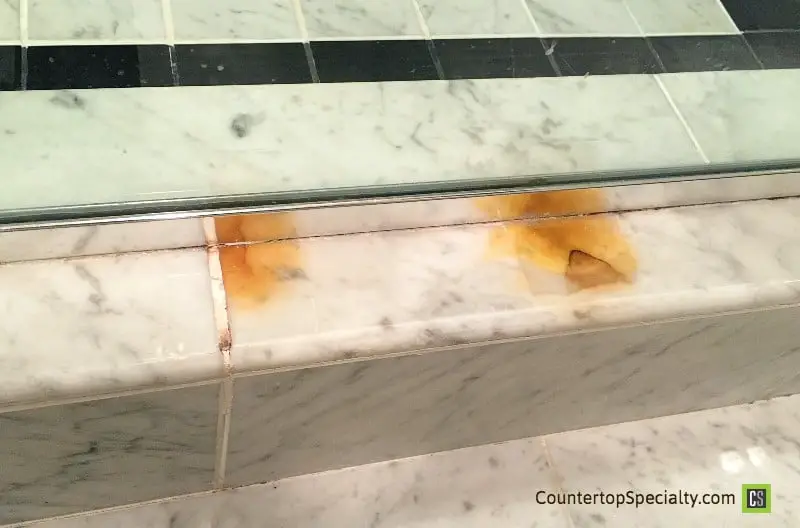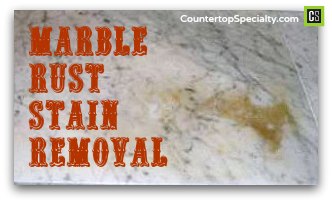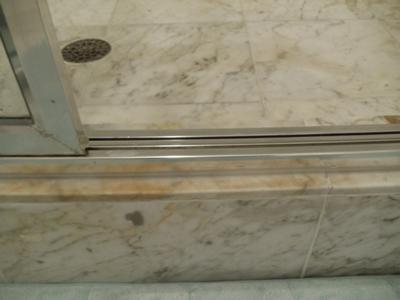White Marble Rust Stain Removal Guide
QUESTION:
I have tried every product out there to remove these brown rust stains. Also, plastic coverings over lumps of product on the rust stain for days. Nothing works.How do you take rust stains out of white marble? Any suggestions? Thank you.

ANSWER:
Yes... a few possible explanations can account for your lack of success removing rust stains. Sounds like you know what a poultice is (lumps of a mixed paste designed to draw out stains), but that is only one piece of the puzzle.Rust stains are the most difficult to remove from marble or any stone, so don't expect quick results, or perfect results in some cases.
Correct ingredients must be used when making the poultice or nothing will happen at all.
A poultice is not a "one-size-fits-all" deal. Different chemicals/ingredients are needed for different types of stains.
You'll find a bunch of poultice recipes online and a few are even correct! But none will work for all marble stains. And again... rust stain removal is the trickiest.
Detailed instructions for cleaning marble stains of all types are found in the Removing Marble Stains e-book.

Although... The easiest solution by far is to use this specially formulated Marble Rust Stain Remover. No guessing with this product. It makes a perfect poultice and is the most effective rust stain removal method.
Repeated applications are required in most cases for complete stain removal or at least to get acceptable results.
This is doubly true for rust stain removal.
It is important to leave a poultice in place for 24 - 48 hours. The key is to wait until it dries out. But once it is dry... it's done and no longer working to remove the stain.
At this point, remove the poultice, inspect the rust stain and apply another poultice if needed. Repeat until the stain is removed or does not get any lighter.
Causes & Variables of Marble Rust Stains
You didn't say what caused the stain or where the marble is installed, but.......
Answers to these questions could change the nature of the problem.
- Is the rust stain from a planter or other metal object left on the marble?
- Is the marble in a wet environment like a shower or outdoor patio?
- Is it on marble flooring?
Rust stains from an object left on the marble are typically easier to deal with. They tend to be recent, surface stains.
Of course, you will know the stain is from an object if it has a very distinct shape and is red-brown
If so, use the Rust Stain Remover product mentioned above. If after 5 or 6 applications you don't get satisfactory results, then you'll have to call in a professional to re-surface the marble (although the stain may be too deep for re-surfacing to remove it).
But if you see stain does lighten some, then keep applying the product/poultice over and over and the poultice will continue to draw out the stain.
Note that the chemicals required for rust stain removal are acidic, so you may notice some etching (dullness) where you used the product/poultice. Can't be helped.... it's the only way.
If so, fix the dull spot using the Etch Remover Polishing product, which restores the shine and color on polished marble. (Not for use on honed marble)
Very old or very deep rust stains can be permanent, but even those can be greatly improved in most cases.
Another possible cause...
Some white marbles... notably Carrara marble... contain iron deposits.
If the marble is in a wet environment or somehow absorbing water (usually from unexposed sides... not the outward-facing surface you see), the iron will rust and bleed through the marble to the surface. Or the iron could already be on the surface and oxidizing.
Typically, rust spots from such a problem are more diffuse yellow-brown stains rather than red-brown with a distinct shape.
Iron deposit marble rust stains result from:
- Flooding (typically on floor tile)
- Plumbing leak (can be wall or floor)
- Grout cracks
- Poor shower / tile installation
On flooring, water can seep up through cracks in the foundation, and poor tile setting or voids in grout in showers allows water to get trapped underneath or behind tiles.
Or, it could be an isolated leak in plumbing.
Of course, if the problem is iron deposit oxidation... you have a potentially much bigger problem.
The staining will continue to occur as long as the marble is exposed to constant moisture.
Your solution then is to fix voids in grout, or if needed, rip out the marble tile, fix the leak or otherwise seal the source of moisture and re-install.
In showers, iron deposit rust stains can sometimes occur when everything is in good condition.
The repeated cycles of water absorbing (into the visible surface) and then evaporating (which is not a problem for most stone) can be enough to oxidize iron deposits embedded close to the surface in white marbles like Carrara marble.
Sealing white marble shower tiles is the the best way to prevent rust stains.
Use a top-quality stone sealer and you'll avoid this problem.
Return to Cleaning Marble Questions & Answers.
Cleaning Marble Rust Stains Off Shower
QUESTION:
We bought a house with a marble shower that has rust stains from well water.What is the best way to clean them and can they be cleaned?? Marilyn
ANSWER:
Marble rust stain removal can be tricky. These are most likely rust stains, but I don't think it's from the well water.If the stains were from the water, then the shower would show staining throughout and it does not.
What has probably occurred here has to do with the nature of many white marbles. White marble, particularly Carrara often contains iron deposits.
If/when the marble is saturated with water, these iron deposits hidden inside the stone will oxidize. Then, as the water moves through the stone to the surface, it carries the rust with it resulting in yellow-brown-orange stains on the marble.
This is not uncommon and seen mostly in floors after a flood or in areas the are constantly exposed to water like a shower.
Looking at the picture you see a heavy stain on the small strip next to the shower door runner.
If this stain was caused from the water, then the rust stain would extend down the entire side like a drip. But instead it stops at the seam, which is another indication this stain is due to internal oxidation of iron deposits and not from well water.
If the grout seams are intact, this typically will not occur. A little water may absorb into the marble during a shower, but it will quickly evaporate and unless an iron deposit is directly below the surface you won't see any rusty discoloration.
However, when there are voids or cracks in the grout or caulk, then water can get beneath the tile where it will not evaporate quickly and can absorb into the stone. It travels through the stone to the surface oxidizing the iron along the way.
So, first thing to do is inspect all grout seams and fix any voids or cracks. Then you can work on the rust stain removal.
Marble stains are not removed by common methods since the stain is below the surface. Also, the method required depends on what stained the marble.
However, you'll find detailed steps for cleaning marble stains of all sorts in the Removing Granite & Marble Stains e-book (see links above and below).
Or simply use the Rust Stain Remover Product linked in the first question above.
Unfortunately, rust stains tend to be stubborn. They can be removed, but you'll likely have to repeat the process several times.
Return to Cleaning Marble Questions & Answers.
Removing Rust Stain in Carrara Marble
by Julia
(New York)
QUESTION:
Is it possible to remove a rust colored spot from Carrera marble?It seems to be a natural mar in the tile--not something I put on it. Thanks
ANSWER:
Yes, removing rust stains from Carrara marble is possible, however, it can be difficult depending on the cause and age of the stain.It could be from:
- Something metallic you put on the marble. If you had, the stain would most likely resemble the shape of whatever object rusted.
- Iron deposits found in white marble rusting from contact with a persistent source of water that leaches through to the surface. This is a more complicated problem that's tougher to fix.
In either case, a regular cleaner and/or cleaning method won't work.
Best bet is to use the Stone and Marble Rust Stain Remover. Very effective.
Or you'll find thorough instructions for rust stain removal (and any other type of stain) in the Removing Marble & Granite Stains Manual.
You didn't say if the marble was a countertop or floor. Rust stains from iron deposits occur most often in floors and showers since water can get trapped under the tiles.
If a countertop, then it's not likely to get worse than it is and may have been there all along. I have Carrara in a bathroom that has a tiny speck of iron on the surface. Looks exactly the same as day it was installed.
But if indeed the stain is fairly noticeable, and seems to be getting larger, then you need to determine where the water is coming from that is saturating the marble, rusting the iron and leaching out to the surface.
To remove the rust stain follow the procedure in the manual recommended above, but it will return if there's a leak or water under tiles, etc.
Return to Cleaning Marble Questions & Answers.
Marble Rust Stain
by Paula
(Fenton, Michigan)
QUESTION:
I had a metal candle holder on the countertop and it got water under it.The candle holder made a rust ring before I moved it.
How can I remove this rust ring?
ANSWER:
You'll have to make and apply a poultice (probably several times) to remove a marble rust stain.A poultice is a paste that chemically acts on the stain and then draws out the staining substance. Making a poultice is easy, but the type of stain you have determines the ingredients of your poultice.
You'll find detailed step-by-step instructions in the Removing Granite & Marble Stains e-book (see links above and below).
Making A Poultice
Making a poultice is easy, but again to effectively remove a marble stain you must use the proper chemical/ingredients in the poultice.
First, mix the proper chemical for the stain with talc powder (or really any absorbent powder) into a paste.
Using a wooden/plastic spatula, apply the poultice to the stain on the marble about 1/2 inch thick with a 1/4 inch border.
Cover the poultice with plastic wrap and seal edges with masking tape.
Let the poultice sit for 24 hours then take the plastic wrap off, but don't touch the poultice. You must let it dry out completely... this is when the marble stain is being drawn out of the marble.
When poultice is completely dry, scrape off with the wooden/plastic spatula and clean. Hopefully the stain is gone, but rust stains are ornery, so you may have to repeat the process until it is gone.
Return to Cleaning Marble Questions & Answers.
Removing Marble Tile Rust Stains
by Dawn
(Chicago, IL)
QUESTION:
How to remove rust stains from 1913 marble mosaic tile floor.ANSWER:
It is possible to remove rust stains, however, rust stain removal can be very difficult, especially if they have been there for a long time.Your marble floor tile has been in place since 1913, so who knows when the rust stains occurred.
It's certainly worth trying to remove them. You may get lucky or at least lighten the rust stain. But if it has existed for years, then you may be stuck.
Removing rust stains takes a special technique or method. Several steps are involved.
Get detailed instructions in the Removing Marble Stains Manual.
Also, it's often necessary to repeat the process several times even with fresh rust stains. So, when removing potentially old stains, you should expect to repeat the process 7-10 times.
You'll have to do it a few times just to get any improvement, but as long as you notice improvement... keep it up!
Professional marble repair / restoration may be necessary, if the DIY method doesn't work. A pro can grind away the stained surface and re-finish the marble floor tile so it looks brand new.
However.... if these stains are old, they may have bled deep into the marble. Or, they may be due to oxidation of metals within the marble.
In either case, professional treatment may not be able to remove the rust stains entirely.
Return to Cleaning Marble Questions & Answers.




